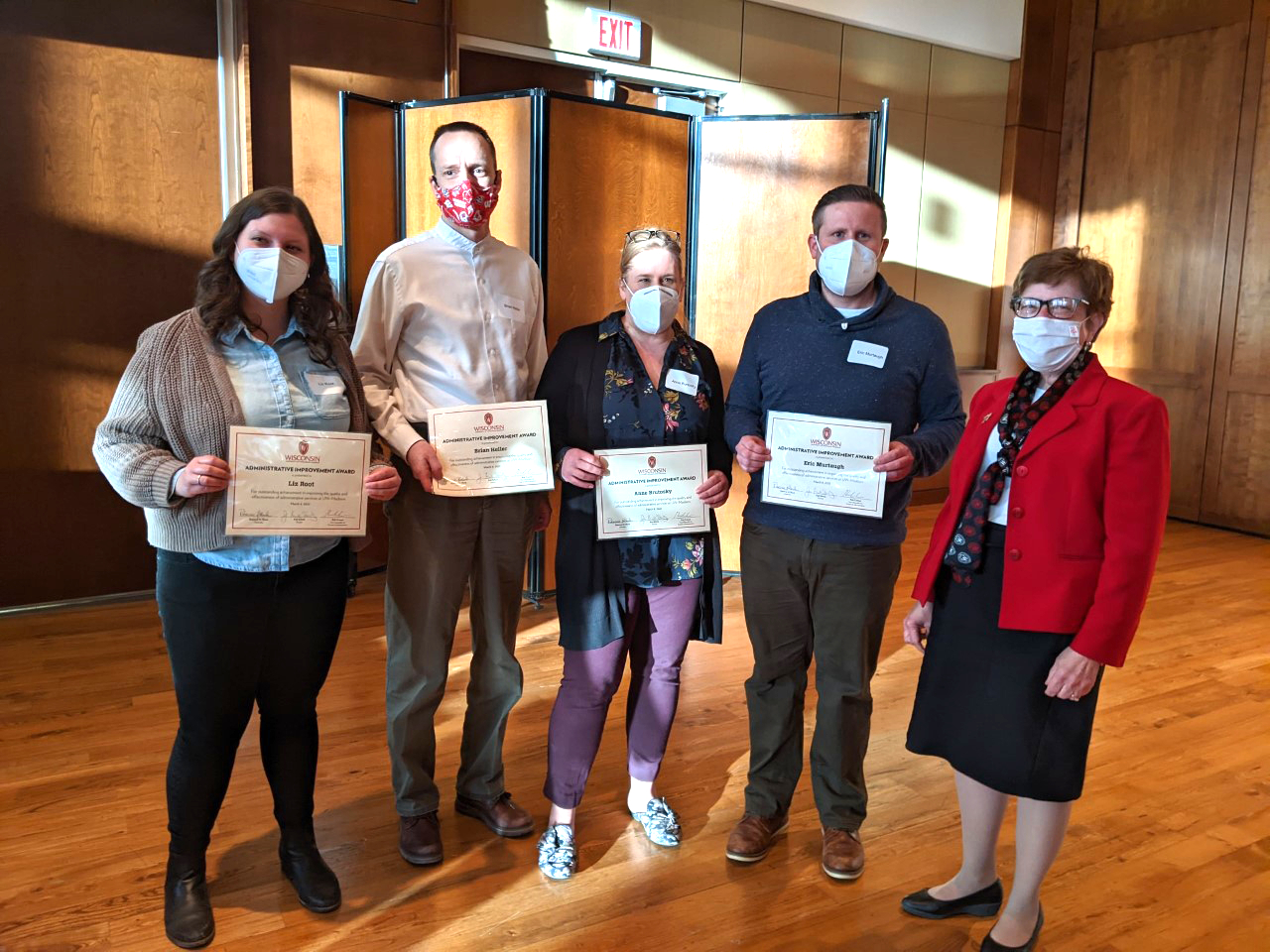
Liz Root, Brian Heller, Anne Brutosky, Eric Murtaugh, and Chancellor Rebecca Blank during the Administrative Improvement Awards ceremony on March 8, 2022.
The UW–Madison Administrative Improvement Awards celebrated their 10th year of recognizing process redesign, process development and customer service innovations that resulted in improved efficiency, revenue, cost savings or service delivery. More than 20 individuals and teams were nominated this year, and five projects were selected to receive the award, including the School of Music production team.
“The number of nominations says a lot about the commitment of thousands of employees across campus to finding better, more efficient and effective ways to do their work,” Chancellor Rebecca Blank said at a recognition ceremony for nominees and recipients on March 8.
“I love the team aspect of this award,” Blank said. “We have five winning projects and 35 people involved, and that type of collaboration is exactly how you get things done.”
Rob Cramer, interim vice chancellor for finance and administration and executive sponsor for the awards, noted that administrative work supports the core missions of UW–Madison. “The Administrative Improvement Awards shine a light on the really impactful work that goes on behind the scenes to improve service and move UW–Madison forward,” Cramer said.
The 2022 Administrative Improvement Award recipients are:
Live stream Production Workflow and Database Team (Mead Witter School of Music)
Anne Brutosky, Brain Heller, Lance Ketterer, Lindsey Meekhof, Max Mindorff, Eric Murtaugh, Liz Root, Oriol Sans, Greg Silver, Ana Tinder
During the pandemic, this team from the School of Music had to quickly figure out how to provide access to musical performances and recitals when audiences were told to stay home. Up to that point, the School of Music had no streaming experience, even though the new Hamel Music Center was equipped to support it. The production team streamed the first public live stream in September 2020. By the end of Spring 2021, the production team streamed more than 130 performances with 56,700 views worldwide.
In developing the live stream capabilities, the production team also created a workflow and database to streamline its processes and improve real-time communication and coordination. The team has since expanded the use of the shared database beyond live streaming to traditional performances at the Hamel Music Center. This fall, the team connected the database and workflows to ticketing and creating concert programs. Team members continue to respond to the changing needs of music performance, sharing the gift of music with supporters around the world.
Dorothy Stepp, MS (Department of Surgery)
Stepp implemented an automated process to increase and track the number of faculty volunteers in critical medical student education activities. Since the project was implemented, 9 out of 11 divisions fully met required medical student education hours. In the 2021–22 school year, the percentage of faculty volunteers increased from 42% to 87%. This has not only been a win for Stepp and her team, but for the faculty involved — and, of course, the students who reap the benefits of these activities.
Nathaniel Haack (Office of Diversity, Inclusion, and Funding – Graduate School)
In his first year as the fellowship officer for campus, Haack noticed a gap in resources and services for students to pursue external fellowships. He created a database of external fellowships, delivered a series of preparation workshops and seminars for external fellowship applicants, and personally provided almost 50 individual consultations with applicants. Nathaniel collaborated with a handful of stakeholders on campus to launch the database in late January 2021. The number of students who received external fellowships will be reported later this year. In the meantime, Haack and his team have received overwhelmingly positive feedback from students.
Streamlining and Automating the Emergency Request Process Team (Office of Student Financial Aid)
Karie Cunningham, Eric Gentz, Doug Jorewicz (OSFA/DoIT), Lo Klink, Martha Kowalski, Chris Lopac, Shane Maloney, Kristen McRoberts, Justin Mumford, Maggie Nowicki, Stevi Parmentier, Nicole Schumacher, Karla Weber Wandel, Katy Weisenburger, Alex White
The Office of Student Financial Aid team improved student access to the Emergency Request Application during the pandemic. They implemented an eForm application that streamlined the back-end processing for financial aid requests, cutting the processing time for HEERF requests in half between the first and second rounds of funding. By the end of December 2021, more than 9,000 students had received HEERF II funding. The current HEERF III form will be repurposed to an emergency request application where institutional aid will be provided to students experiencing financial crises unrelated to the pandemic.
Modernization of the Undergraduate Academic Standing Process Team (Office of the Registrar)
Katie Block, Corey Campbell, Ellen Clark, Joe Goss, Scott Krause, Diana Maki (Office of the Registrar and Office of Undergraduate Advising), Debbie Moy, Jim Vogel, Beth Warner
Academic standing reflects a student’s progress towards their degree and can indicate if a student is experiencing academic difficulties and needs additional support. Academic governance approved changes to the undergraduate academic standing process a few years ago. In response, the Registrar’s Office prioritized and funded a project to completely update the Student Information System academic standing processes. The team collaborated with more than 20 partners from schools, colleges and divisions at UW–Madison. Team members successfully applied the “Good Standing” label to almost 398,000 students dating back to 1979, providing better service to students when their transcripts are reviewed by graduate school admission committees and potential employers. The modernized process resulted in improved efficiency and cost and time savings, freeing up more time to serve students.
